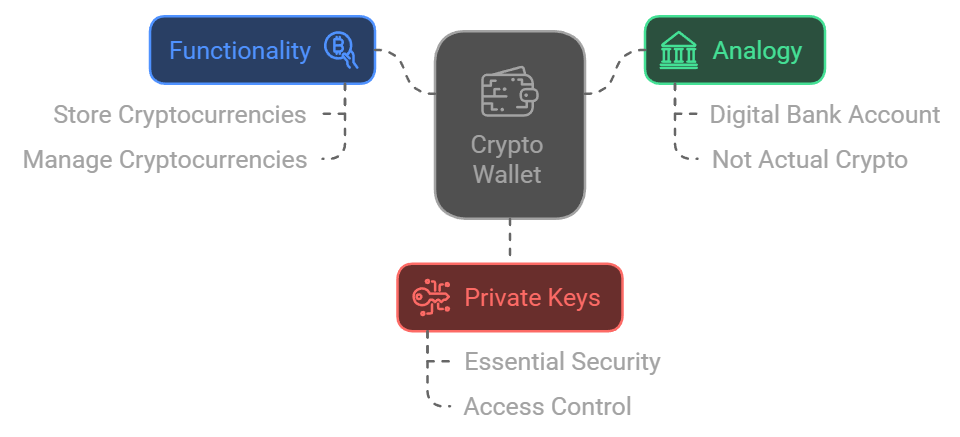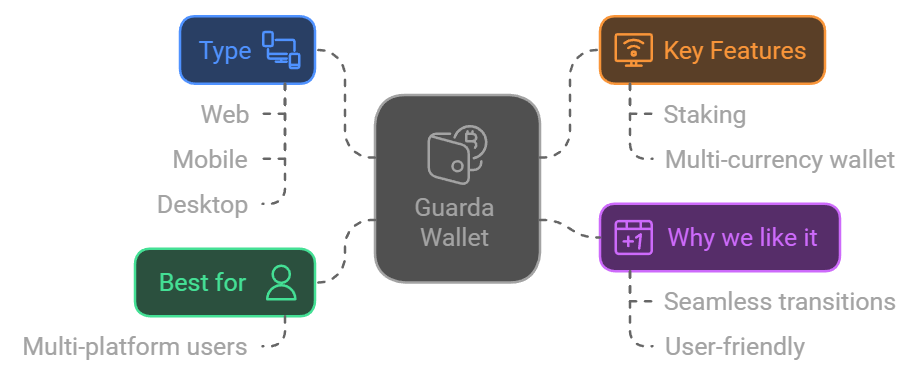Top 10 Crypto Wallets Comparison: Choose the Right one for your Security!
Cryptocurrency is booming, and with it, the demand for safe and easy-to-use wallets is skyrocketing. But with so many choices out there, how do you find the right one? In this Top 10 Crypto Wallets Comparison for 2024, we break down the best wallets to keep your digital assets secure, accessible, and compatible with your everyday devices. Whether you’re a crypto newbie or a seasoned trader, choosing the right wallet is crucial—so let’s explore the top picks and find the perfect fit for your crypto journey!
In this guide, we’ll break down the top 10 crypto wallets for 2024, focusing on types of wallets, ease of use, and compatibility. Let’s dive in!
What Is a Crypto Wallet?
A crypto wallet is a tool that allows you to store and manage your cryptocurrencies. Think of it like a digital bank account. It doesn’t hold your actual crypto, but it stores your private keys essentially the password to your funds.

Types of Crypto Wallets
Choosing the right wallet depends on your needs. Here’s a breakdown of the main types:
1. Hardware Wallets
- Best for: Maximum security.
- What it is: A physical device, like a USB stick, that stores your private keys offline.
- Why choose it: Since it’s not connected to the internet, it’s nearly impossible to hack. However, it’s less convenient for daily transactions.
- Popular examples: Ledger Nano X, Trezor Model T.
2. Software Wallets
- Best for: Everyday use.
- What it is: Software you install on your computer or phone.
- Why choose it: It’s convenient and often free. Great for beginners who need easy access to their crypto.
- Popular examples: Exodus, Electrum.
3. Web Wallets
- Best for: Quick access.
- What it is: A wallet hosted online that you access through your browser.
- Why choose it: Simple to use, especially for newcomers. But be aware that web wallets are vulnerable to hacks.
- Popular examples: MetaMask, Coinbase Wallet.
4. Paper Wallets
- Best for: Long-term storage.
- What it is: A printed sheet of paper containing your private and public keys.
- Why choose it: This is a cold storage method, meaning it’s offline and very secure. However, losing the paper means losing your crypto.
- Popular example: Paper wallets created through BitAddress.

Ease of Use: What Makes a Wallet Beginner-Friendly?
When picking a wallet, ease of use is crucial, especially if you’re new to crypto. Here are key factors to consider:
1. Simple Interface
Look for wallets with easy-to-navigate interfaces. Some wallets are designed with beginners in mind, making sending and receiving crypto a breeze. Trust Wallet and Coinbase Wallet are great examples of beginner-friendly wallets.
2. Multi-Currency Support
If you hold multiple cryptocurrencies, a wallet with multi-coin support can save you time and hassle. Exodus and Atomic Wallet support a wide range of digital assets, making them ideal for diversified portfolios.
3. Quick Setup
Wallets like MetaMask and Trust Wallet offer quick, one-click setups. You can download the app, create an account, and start managing your crypto in minutes.

Compatibility: Desktop, Mobile, and Beyond
Crypto wallets come in many forms, each suited to different devices and needs. Here’s how they stack up in terms of compatibility:
1. Desktop Wallets
- Best for: Users who prefer managing crypto from their PC or laptop.
- Popular examples: Electrum, Exodus.
- Why choose it: More security options, like offline transaction signing.
2. Mobile Wallets
- Best for: On-the-go transactions.
- Popular examples: Trust Wallet, MetaMask (mobile version).
- Why choose it: Perfect for people who need access anytime, anywhere. Most are available for both iOS and Android.
3. Hardware Wallets with Mobile Integration
- Best for: Secure users who still want flexibility.
- Popular examples: Ledger Nano X, which connects to a mobile app.
- Why choose it: Combines security with convenience by allowing mobile management of your assets.
4. Paper Wallets
- Best for: Offline, long-term storage.
- Why choose it: Great for those who don’t plan to move their crypto often. Not practical for frequent transactions, but unbeatable in terms of security when stored properly.
Top 10 Crypto Wallets for 2024: Detailed Comparison
Here’s a look at the top 10 crypto wallets that stand out in 2024, based on security, ease of use, and compatibility.
1. Ledger Nano X
- Type: Hardware wallet
- Best for: Security-focused users
- Key features: Bluetooth connectivity, supports over 1,500 cryptocurrencies.
- Why we like it: Offers top-notch security with mobile and desktop compatibility.

2. Trezor Model T
- Type: Hardware wallet
- Best for: Cold storage
- Key features: Touchscreen, open-source software.
- Why we like it: Highly secure and user-friendly for beginners.
3. Trust Wallet
- Type: Mobile wallet
- Best for: Beginners
- Key features: Supports multiple cryptocurrencies, integrated with DApps (Decentralized Applications).
- Why we like it: Simple, intuitive, and great for mobile users.

4. MetaMask
- Type: Software wallet (browser/mobile)
- Best for: Ethereum and DeFi users
- Key features: Easy access to decentralized apps, available on browser and mobile.
- Why we like it: Best for Ethereum users and those dabbling in DeFi.
5. Exodus
- Type: Software wallet (desktop/mobile)
- Best for: Multi-currency users
- Key features: Supports 200+ cryptocurrencies, integrates with Trezor.
- Why we like it: Sleek design, perfect for beginners.
6. Coinbase Wallet
- Type: Web/mobile wallet
- Best for: Newcomers
- Key features: Linked to Coinbase exchange, multi-currency support.
- Why we like it: Easy integration with the Coinbase exchange makes it beginner-friendly.
7. Atomic Wallet
- Type: Software wallet
- Best for: Privacy-conscious users
- Key features: Built-in exchange, staking options.
- Why we like it: Allows users to exchange crypto without leaving the wallet.
8. Electrum
- Type: Desktop wallet
- Best for: Advanced users
- Key features: Customizable fees, cold storage compatibility.
- Why we like it: Ideal for Bitcoin holders who want advanced features.

9. Mycelium
- Type: Mobile wallet
- Best for: Bitcoin users
- Key features: Hardware wallet support, local trader feature.
- Why we like it: Offers top-tier security and compatibility with hardware wallets.
10. Guarda Wallet
- Type: Web/mobile/desktop wallet
- Best for: Multi-platform users
- Key features: Supports staking, multi-currency wallet.
- Why we like it: Provides seamless transitions between platforms.

Security: Protecting Your Crypto
Security should always be your top priority when selecting a wallet. Here’s how the top wallets protect your funds:
1. Backup and Recovery
Most wallets provide a recovery seed phrase. It’s a string of words you must keep safe. If you lose access to your wallet, this is how you get it back. Never store your seed phrase online.
2. Biometric Authentication
Some wallets, like Trust Wallet, allow biometric logins (fingerprint or face recognition), adding an extra layer of security.
3. Open-Source vs. Closed-Source Wallets
Open-source wallets like Electrum allow anyone to inspect the code for vulnerabilities. Closed-source wallets, like Exodus, are user-friendly but trust is placed in the company’s developers.

Conclusion: Which Crypto Wallet Is Right for You?
Choosing the best crypto wallet in 2024 comes down to your individual needs. If security is your main concern, a hardware wallet like Ledger Nano X or Trezor Model T may be best. For daily use and convenience, wallets like Trust Wallet or Exodus offer easy access on both mobile and desktop.
Before making your choice, consider how often you’ll use your wallet, what level of security you need, and how many different cryptocurrencies you plan to hold.
I’m personally using Metamask, and Guarda for my mobile and Trust wallet for everyday use DeFi. i don’t have hardware wallet i find paper wallet secure enough, but i gave you the information i have about wallets. if you have any questions feel free to contact me.
interested in Bitcoin news?


